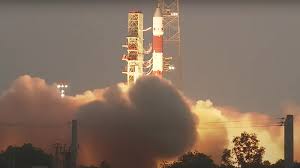Sriharikota, May 18, 2025: India’s trusted space workhorse, the Polar Satellite Launch Vehicle (PSLV), suffered a rare failure on Sunday when ISRO’s PSLV-C61 mission carrying the Earth Observation Satellite EOS-09 failed to reach orbit. The launch, which took place at 5:59 AM IST from the Satish Dhawan Space Centre, ended prematurely due to an anomaly during the third stage of flight—marking the third failure for PSLV in over three decades.
ISRO Chairman V. Narayanan confirmed that the issue stemmed from a sudden drop in chamber pressure in the third stage, causing the vehicle to deviate from its trajectory. Preliminary analysis suggests the failure may be linked to the flexible bearing nozzle system, a component critical to steering during the burn phase.
Despite a nominal lift-off and successful performance of the first two stages, the mission could not proceed beyond the third stage. The failure meant the EOS-09 satellite could not be placed into orbit. A Failure Analysis Committee has been formed to determine the exact cause and suggest corrective measures to avoid recurrence.
This incident adds to only two previous failures in PSLV’s history: its maiden flight in 1993 and the PSLV-C39 mission in 2017. Out of 63 PSLV missions so far, 60 have been successful, keeping ISRO’s success rate among the highest in the world.
The Earth Observation Satellite EOS-09 was designed to bolster India’s capabilities in cartography, resource monitoring, and disaster management.
Despite the setback, ISRO remains one of the most reliable space agencies globally. With a strong record that includes landmark missions like Chandrayaan-3 and the Mars Orbiter, the agency is expected to recover quickly and apply the lessons from this mission to future launches.
ISRO’s Earth Observation Mission Fails After PSLV Anomaly, Third Such Setback Since 1993

